Part 2 of 2
An Unexpected Party
The Fortean Society was founded on January 26, 1931, with a great fanfare of sounding brasses, tinkling cymbals, after-dinner speeches, and press releases. Thereafter the Society did practically nothing for six years.
The venue for that First Founders’ Dinner was the residential suite of newspaper publisher J. David Stern (Philadelphia Record, Camden Courier-Post, New York Post after 1933) in New York City’s posh, twin-chimneyed Savoy-Plaza Hotel (1927-1965; currently the site of the GM Building and an Apple Store).

Charles Hoy Fort
Speeches and Ginger Ale
This was something of a surprise party for the Society’s namesake, Charles Hoy Fort. He thought he was showing up for a private dinner party with Stern and Theodore Dreiser.
Fort was a funny little man, now about 56, who’d spent much of his life holed up in the New York Public Library, reading newspapers and jotting down odd, unexplained phenomena he read about (frogs raining out of the sky; spontaneous combustions of people and animals; unidentified flying objects).
Theodore Dreiser had formed the idea that Fort was a genius, a new messiah. Stern was a fan, too, and took note of the cult following around Fort. In 1930 he suggested to the bright young novelist Thayer that there should be some kind of “Fortean Society” in furtherance of Fort’s goals and interests . . . whatever those might happen to be.
A New York newspaper columnist had this to say about the dinner:
[A] curious assortment . . . You would hardly expect to find Theodore Dreiser and Booth Tarkington in the same boat. But there they are, and Harry Leon Wilson also.[1] Likewise Ben Hecht, Edgar Lee Masters, Burton Rascoe, Harry Elmer Barnes and John Cowper Powys. Thayer, author of “Thirteen Men” and “The Illustrious Corpse,” is the secretary of the society. Our host, Mr. Stern, publisher of the Philadelphia Record and a string of other papers, is evidently its angel, for the time being at any rate. . . .
They put one over on Fort himself in order to get him there. When he arrived he had no idea of what the shootin’ was all about. He thought he had been invited to dine and spend the evening with Stern and Dreiser. Instead of which he found himself cast for a role that might appall even a strong head. He had to sit and listen while he was described as one of the great men of all time, to hear it said that his work was the biggest thing that had happened in Dreiser’s life, that it was the opening of a new world concept. During all of which he looked patiently and meditatively at his cigar and sipped ginger ale. . . .
For twenty-six years Charles Fort has been gathering “a procession of data, that science has excluded.” When
certain actual and provable phenomena do not fit into the scientists’ explanations they throw them out, ignoring or denying their existence . . . It was Dreiser who procured the publication of Fort’s first opus. The manuscript of “The Book of the Damned” had gone the rounds and met with universal editorial sniffs. Dreiser . . . took it to [Horace] Liveright,[2] whose firm was originally as shy as his rivals. Finally Dreiser insisted, threatening to take his own books to another firm, and Liveright capitulated.
The purpose of the Fortean Society, in addition to making propaganda, will be to help Fort collect more data, and to establish a fund for the preservation of the notes and references he has compiled.[3]
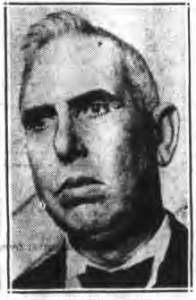
Dreiser
He went off in a snit.
Charles Fort didn’t get to collect much more data. He died a year later. He left his many boxes of scribblings in the care of Society secretary Tiffany Thayer, who refused to yield them to Teddy Dreiser when Dreiser insisted that he should have inherited them.[4] Dreiser went off in a snit.
Thayer went off to Hollywood. It was still the “pre-Code” period, and for a while his racy writings were in hot demand. In 1932 three of his novels were processed into films—Call Her Savage, with Clara Bow; Thirteen Women with Myrna Loy; and Strangers of the Evening (based on Thayer’s The Illustrious Corpse) with Zasu Pitts. He also wrote scripts and on occasion acted.
“Boys Who Ought to Go Regularly to a Gym”
His name by now was a byword for slapdash, lurid, popular fiction. In the mid-1930s F. Scott Fitzgerald, despairing of the state of the novel, wrote that people hardly read anything anymore but Professor (Henry Seidel) Canby’s Book-of-the-Month Club selections, while “curious children nosed at the slime of Mr. Tiffany Thayer in the drug-store libraries.”[5]
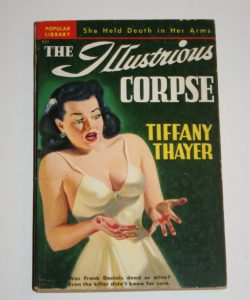 Writing as “Constant Reader” in The New Yorker in 1933, Dorothy Parker really unsheathed her stiletto for Thayer, congratulating him for “keeping chaste the youth of America by presenting the whirl of sex as something as glamorous, appealing and ecstatic as a hog-wheel in a Chicago abattoir.” The subject under review was one of Thayer’s least consequential offerings, An American Girl, which Dottie dissected in hilariously disproportionate detail:
Writing as “Constant Reader” in The New Yorker in 1933, Dorothy Parker really unsheathed her stiletto for Thayer, congratulating him for “keeping chaste the youth of America by presenting the whirl of sex as something as glamorous, appealing and ecstatic as a hog-wheel in a Chicago abattoir.” The subject under review was one of Thayer’s least consequential offerings, An American Girl, which Dottie dissected in hilariously disproportionate detail:
When one had put sex carefully away on the highest cupboard-shelf, in a box marked “Winter Hats—1916,” it is somewhat melancholy to read a book by Tiffany Thayer—melancholy, that is, in that no wistful memories whatever are thus evoked. Mr. Thayer, it is deplorably unnecessary to explain, has achieved great prominence in that school of American authors which may be described as the boys who ought to go regularly to a gym.[6] He is beyond question a writer of power; and his power lies in his ability to make sex so thoroughly, graphically, and aggressively unattractive that one is fairly shaken to wonder how little one has been missing. . .
Mr. Thayer’s latest work is called, with that simplicity which is the gaudiest flower of pretentiousness, “An American Girl.” I am at a loss to comprehend why this was the selected title, since the book displays any number of American girls, all alike in seeming to be, as Henry James said of George Sand, highly accessible. Perhaps it was felt that the name established an excellent base for a superstructure of sequels—”An American Girl at Yale,” “An American Girl on a Gunboat,” and so forth. Or perhaps Mr. Thayer, too, sometimes nods, and simply couldn’t think of another thing to call the blamed book . . .
“An American Girl,” from what I have been able to assimilate of it, is the combination of a tale of the wilder side of Hollywood life with a romance of revolution in a mythical mountain kingdom. It is, of course, neither any of my business nor any concern of Mr. Thayer’s that he has wedded, in one volume, the two forms of fiction that are to me the most profoundly unreadable . . .[7]
Titanic megalomania
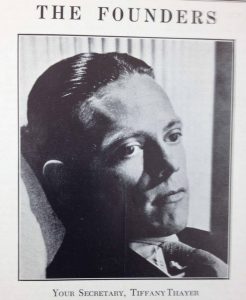
Your secretary, Tiffany Thayer
By 1937 The Fortean Society was completely dormant, little more than a funny memory. Two major events in the next few years would revive it and shape its weird direction.
The first was that Tiffany Thayer moved back to New York City and took a job writing cigarette ads for J. Walter Thompson. This meant that he could conveniently reconstitute the Fortean Society, hold literary dinners and soirées, perhaps order Fortean Society stationery, and even publish some sort of journal.
Such a magazine could stuff the back pages with some of the late Mr. Fort’s unpublished findings (“THE NOTES OF CHARLES FORT ARE PRINTED HERE for the FIRST TIME”—proclaimed the first issue in September 1937), while up front there would be articles about some cause or controversy (“WHO KILLED EARHART AND NOONAN? . . . Amelia Earhart and Fred Noonan were murdered by Dogmatic Science.”)
In between, the magazine would list Society doings, correspondence, pictures of Your Secretary (Thayer), and news clippings. News clippings mailed in by these very very earnest people who lived in the back of beyond and believed that Thayer’s brand of “Forteanism”—exposure of scientific fakery and secret information that the People in Charge don’t want you to know—was a magnificent cause to get behind.
This, then, was the basic format of The Fortean Society Magazine (later retitled Doubt) and it stayed that way for twenty-two years.
* * *
The Fortean Society
is the Red Cross
of the Human Mind
We are asked many times every day what the Fortean Society is, what its purposes are, what its requirements for membership. This has been a topic of great interest (and some concern) ever since January 26, 1931 old style…
Atheists, anarchists, Jews, astrologers, Republicans, FBI agents, Communists, poets, are all on the rolls—for a great diversity of reasons . . . A good many adherents of a Flat Earth are members, anti-vivisectionists, anti-vaccinationists, anti-Wasserman-testers, and people who still believe disarmament of nations would be a good thing.
CHARLES FORT’S PHILOSOPHY
Fort himself, coping with ideas which no man had ever dared to think before, called out in The Book of the Damned: “Char me the trunk of a redwood tree. Give me pages of white chalk cliffs to write upon. Magnify me thousands of times, and replace my trifling immodesties with a titanic megalomania—then might I write largely enough for our subjects . . .”
(Fortean Society brochure, early 1940s)
* * *
You can read through this gaseous nonsense above, right to the end, and never really find out what the purposes of the Fortean Society are.
Thayer had a finely tuned sense of the farcical—he wrote ad copy, after all—and knew that the nuttiness of the whole Fortean cause could provide wonderful cover for any outré or mischievous opinion he might come up with. (“How can you believe such an outrageous thing?” I’m just telling you my Fortean opinion. “Oh, okay then.”)
Circus Day Is Over
Well—almost any opinion. The second big event that shaped Thayer’s Fortean Society was American entry into the Second World War. He opposed the war, supported conscientious objectors.
It was one thing to say that Amelia Earhart was never found because the navigational charts of the Pacific are all wrong, or suggest that the Hindenburg crashed because somebody shot it out of the sky. It was quite another to declare, in January 1942, that Pearl Harbor was a put-up job and that Franklin Roosevelt and the international money-crooks had been scheming for another world war for years.
But that’s just what Tiffany Thayer did in his post-Pearl Harbor cover essay, “Circus Day Is Over.” Now, its wheezy prolixity makes it almost impossible to excerpt intelligibly, but here are some snippets anyway:
[W]e quietly charge that the present international hostility is the most ghastly fraud ever perpetrated in history with the possible exception of the Holy Inquisition. By that is meant that the headlines you consume each day as “news” are not really news at all but are only the latest releases to us dupes of our daily capsule of dope. Every time you listen to a “news” broadcast on the radio you are taking poison through the ears. . .
The reason for this condition is, clearly, to preserve tottering, rotten institutions which mankind—partially enlightened by the events of 1914 to 1918—was undermining diligently, intent—as the commonality has ever been—upon self-betterment. It is this determination for self-betterment which puts the fear of God into Our Betters perennially and demands military regimen for the rest of us on an average of at least once every twenty-five years . . .
Thayer then goes on to tell the tale of Edward VIII, Duke of Windsor, and why he was really forced from the throne. It wasn’t because of Mrs. Simpson, it was because he refused to go along with the war-mongerers’ plan for another war. Etc., etc.[8]
No plea of Fortean nuttiness could cover this sin— after all, aren’t seditionists basically crazy to begin with? Some readers were outraged, some senior Forteans broke with Thayer. As noted earlier, Alexander Woollcott compared Thayer’s editorial to the work of jailed “Nazi propagandist” George Sylvester Viereck.
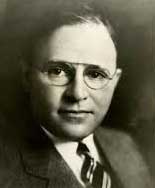
Julius David Stern
A career meltdown
But the biggest noise came from Society co-founder J. David Stern, who was in the middle of a psychological meltdown and libel suit that would eventually destroy his career as a newspaper publisher. He accused Thayer of being seditious, pro-Nazi, what-have-you; and demanded that the FBI investigate him.
There had always been some friction between the two on the FDR question (Thayer despised FDR; Stern’s newspapers backed him to the hilt), but Stern was going through a particularly rough patch just now.
Some months earlier, in April 1941, Stern had got into a newsprint fist-fight with a well-regarded journalist named John O’Donnell, Washington bureau-chief for the New York Daily News and the Washington Times-Herald. O’Donnell had written that there would be a inquiry in the Senate next day regarding the (illegal) use of American warships to convoy Lend-Lease materiel to Britain. President Roosevelt, via his press secretary, immediately denounced this forecast and implication as “a deliberate lie.”
The question was indeed raised in the Senate the following day. But not before Stern had run off half-cocked with a screeching editorial in his Philadelphia Record. Evidently he’d been gunning for O’Donnell for a long time.[9]
‘A DELIBERATE LIE’
In the Daily News, of New York, and the Times-Herald, of Washington, appeared yesterday a story that United States warships were secretly convoying supply ships across the Atlantic.
A few hours after the story appeared, the President denounced it as ‘a deliberate lie.’
The story was written by John O’Donnell, head of the Washington Bureau for the New York Daily News and Washington Times-Herald.
John O’Donnell is a Naziphile. He makes no secret of it. On numerous occasions, to all friends and barflies within hearing, he has broadcast his sympathy with most of Hitler’s aims—such as destruction of the British Empire, suppression of Labor Unions and Liquidation of Jews. (…)
O’Donnell sued for libel and won in the end, although the original award of $50,000 was whittled down to $8,000 by the final judgment. Stern brought in a troupe of Washington correspondents to testify about O’Donnell’s forthright remarks on the Jewish question. The court thought these witnesses’ claims dubious. Moreover Stern went and shot himself in the foot by publishing some testimony that just repeated the original libel. This showed malice, quoth the court.[10]
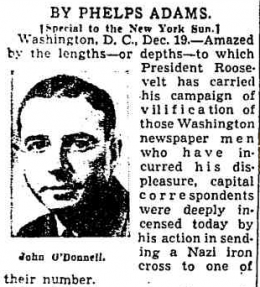 Stern’s newspapers solidly supported FDR through all his terms. FDR himself tried to influence the libel case. Shortly before it went to trial, Roosevelt, at a press conference, dramatically took out a German Iron Cross medal and asked a newsman to please present it to John O’Donnell (who was not present at the gathering). This bit of theatricality was roundly condemned by the press.
Stern’s newspapers solidly supported FDR through all his terms. FDR himself tried to influence the libel case. Shortly before it went to trial, Roosevelt, at a press conference, dramatically took out a German Iron Cross medal and asked a newsman to please present it to John O’Donnell (who was not present at the gathering). This bit of theatricality was roundly condemned by the press.
When the case reached final judgment in March 1947, Stern was almost bankrupt from a Newspaper Guild strike. He had to close down the Record and sell off his last newspapers to pay legal bills. Meantime Tiffany Thayer was visiting Ezra Pound in St. Elizabeth’s Hospital, and writing in the Fortean magazine about what a swell guy that John O’Donnell was for writing about Ezra so fairly (Part 1 of this article).
As a postscript that October the US Supreme Court refused to review the libel case. It had dragged on for four-and-a-half years. By this point, J. David Stern no longer appeared on Fortean Society’s founders list.
Still incarcerated in early 1947, but shortly to be released from Lewisburg Penitentiary was George Sylvester Viereck (1884-1962). Viereck had known Tiffany Thayer since the 1930s, but that is not remarkable as Viereck seems to have known everyone. Some poetry by Viereck appeared in the Fortean magazine (now called Doubt) in 1952.
“Religious quacks and hysterical refugees”
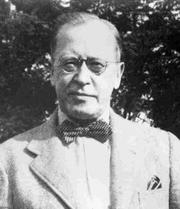
Viereck
G. Sylvester Viereck’s relentless, repeated prosecution by the US Department of Justice is a grueling tale, almost incomprehensible in its complexity. Viereck had been been a well-regarded poet and critic for over thirty years when he set up a pro-German publishing house in Scotch Plains, NJ. That was 1939.
He registered with the State Department under the Foreign Agents Registration Act because he was receiving some funds through the German Embassy. The publishing house, Flanders Hall, mainly reprinted and distributed books with anti-British and anti-interventionist themes.
Viereck also lobbied fiercely with sympathetic anti-war Congressmen, getting them to use their franking privilege to send out Congressional Record reprints.[11] The suggestion has been made that Viereck also made cash payments to some of these Representatives, which he recorded in a little black book. (H. Keith Thompson has claimed to have been given such a book for safekeeping; he eventually burned it.)[12]
Viereck closed down the publishing house and broke ties with the German government a few months before Pearl Harbor. However he was indicted shortly afterwards by the Department of Justice, purportedly for having made insufficient disclosures on his Foreign Agents Registration form. When the case came to trial in early 1942, America was at war and in a fever. The DoJ portrayed Viereck as an active Nazi propagandist (though that was not the indictment) and got him convicted. Then the case was overturned thanks to the prosecutor’s gross irregularities. Justice tried Viereck again in 1943, and he was again convicted, with a sentence of 2-6 years.
While he was in prison, the DoJ and the media went to work on his family, successfully alienating his surviving son Peter (another son died at Anzio) and wife Margaret (“Gretchen”). Viereck had transferred his assets to Margaret before going to prison, and now she declared she was getting a divorce and giving all his money to charity, to atone for Nazi evil.[13]
“She is going through the menopause and seems to have fallen under the influence of religious quacks and hysterical refugees,” he wrote Poultney Bigelow, a loyal, elderly friend, in 1945.
He sent Bigelow a heartbreaking verse about his situation, “Postscript,” beginning:
I foundered in a sea of hate.
The rodents scampered. Let not that
Be your apology: the rat
Deserts the ship but not its mate.
I shall not whimper, shall not moan:
We are most strong when most alone.
Margaret ceased to correspond, and then the DoJ barred Viereck from receiving any mail from non-relatives (such as Bigelow). Viereck did manage to get a few letters through, using the friendly offices of James Laughlin (the steel heir and New Directions poetry man), c/o of the National Press Building in DC. [14]
When Viereck got out of prison he was penniless and homeless. His Upper West Side apartment was long gone; his ex-wife and son didn’t want him to darken their doorsteps. Fortunately some wealthy friends such as Bigelow stood by him.
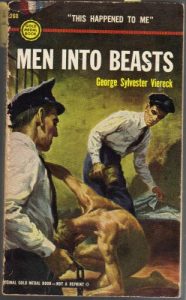 Viereck got back on his feet, published a lurid memoir about life in prison (Men into Beasts) and moved into that “circular suite” in the Hotel Belleclaire where he supposedly held fancy parties with H. Keith Thompson, F. P. Yockey, and a cast of stranger notables in attendance (see Part 1). In the late 1950s he partially reconciled with son Peter, then a college professor living in western Massachusetts.
Viereck got back on his feet, published a lurid memoir about life in prison (Men into Beasts) and moved into that “circular suite” in the Hotel Belleclaire where he supposedly held fancy parties with H. Keith Thompson, F. P. Yockey, and a cast of stranger notables in attendance (see Part 1). In the late 1950s he partially reconciled with son Peter, then a college professor living in western Massachusetts.
After his release from prison in May 1947, there is a markedly upbeat tone in Viereck’s correspondence to Poultney Bigelow. He’s reading the new Kinsey book and finds it “quite remarkable,” highly recommends it to the 93-year-old Bigelow. Since Alfred Kinsey’s Sexual Behavior in the Human Male was nominally published in 1948, it appears Viereck had an advance proof, possibly supplied by fellow Fortean and longtime German-American friend Harry Benjamin, MD.
Back in the 1920s-30s, Benjamin and Viereck had been great champions of German/Austrian sexologists Magnus Hirschfeld and Eugen Steinach. They visited Steinach in Vienna; they squired Hirschfeld around America. (Hirschfeld was not only a Jew but an open homosexual, as well as a regular target of the early Nazi Sturmabteilung; all of which makes it ironic that anti-Nazi propagandists occasionally tried to depict Viereck as a Jew-hater, which he never was.) In the 1930s, “rejuvenation” was a huge craze, particularly for aging males, and there were many solutions offered: vasectomy, vasoligation, vascular resectioning.
On June 26, 1948 Viereck wrote Bigelow, “It seems to me that since you are so young biologically [Bigelow was 94] you should do something about some of the concomitance of age such as slightly defective hearing. I think my friend, Dr. Benjamin, who is at present in San Francisco, could help you with a few injections. I’ll tell you more about that when I see you.”[15]
The Psychologically Pure Aryan
This selfsame Harry Benjamin, MD, of San Francisco and New York, first came to fame as one of those monkey-gland “rejuvenation” docs of the 1920s and 30s. Harry Benjamin was one of the few Forteans who not only belonged to Tiffany Thayer’s Fortean Society, but also seemed to steer his career’s course according to Fortean principles. That is, he believed most medical science was quackery, and that unexplained phenomena deserved investigation. The mere fact that he was a gerontologist who took his own medicine and lived to 101-and-a-half, would indicate that he was more than simply an eccentric physician.
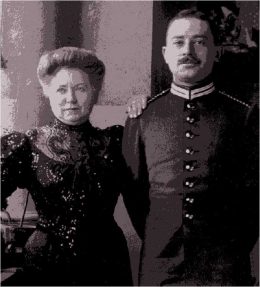
Harry in the Prussian Guard
With his Prussian mother
Harry had been born in Berlin, in 1885. His immediate family was German, as in Prussian. Religious confession: Evangelische / Lutheran. Harry also had at least a Jewish paternal grandfather, thus his last name. This caused him some taunting in the Berlin Gymnasium he attended in the 1890s, where the gentiles thought him Jewish and the Jews rejected him as a Christian. [16]. But for most of his life—certainly after he arrived in New York in 1913—the surname was an advantage rather than a handicap. There was a vague assumption in New York, certainly after 1945, that Harry was some kind of refugee from the horrors of Hitler’s Germany. Actually Harry’s life was a very different picaresque.
He’d first come over as a newly minted physician and protegé of a hot-shot Berlin doctor named Friedmann, who said he had a cure for types of tuberculosis. Friedmann’s technique was to feed tuberculosis bacilli to some turtles, then retrieve the germs from the turtles’ urine. These attenuated bacilli would then be injected into the human patient. Friedmann hoped to get a million dollars from someone in America.
But the turtle-urine vaccine wasn’t as effective as Friedmann claimed, and Harry refused to fudge the numbers for Dr. Friedmann, who seemed to be playing a scam for that million-dollar cure. And so young Harry Benjamin quit Friedmann’s employ and got stuck in New York City at the start of the First World War.
At first he worked as a kind of impoverished internist, then a specialist in the new field of endocrinology. After 1930, with G. S. Viereck, he brought Magnus Hirschfeld around the USA on a lecture and visiting tour of America. By then Harry was advising vasectomies or vasoligations as a rejuvenation technique (the “Steinach method”), and was experimentally injecting new hormones into patients.
He wrote a section for a WW2 book about American GIs’ sexuality (sold by Tiffany Thayer and the Fortean Society in the mid-1940s as Sex in Wartime), and then did a similar treatment of prostitution.
In San Francisco, where he and wife lived during the summers, Benjamin often saw Alfred Kinsey, who was during field work there in the ’40s. In 1948 Kinsey referred to Benjamin an adolescent, physically male, who in the mind of the subject and the subject’s mother, really ought to have been female. Benjamin gave hormones and referred the youngster to some European surgeons. No one kept track of the transformed girl afterwards, but such was typical for those days.
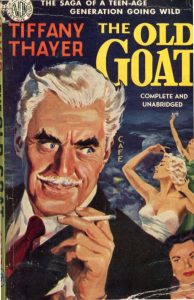 Now in his 60s, Dr. Benjamin was at the start of his newest and weirdest career. Hitherto Harry had been the doc renowned for making golden-agers feel like 30-year-olds. But he was forever after to be known as the guru of “transsexualism.” In 1953 he had Tiffany Thayer introduce him to Christine Jorgensen so she could forward her “help me” fan letters his way.
Now in his 60s, Dr. Benjamin was at the start of his newest and weirdest career. Hitherto Harry had been the doc renowned for making golden-agers feel like 30-year-olds. But he was forever after to be known as the guru of “transsexualism.” In 1953 he had Tiffany Thayer introduce him to Christine Jorgensen so she could forward her “help me” fan letters his way.
Surely, other than raining frogs and flying saucers, there cannot have ever been a more Fortean notion than transsexualism, the belief that one could be physically of one sex yet mentally of the other. Yet Harry Benjamin held fast to this biological explanation, as did his assistant, Virginia Allen. Theirs was not an easy fight. They were proposing hormone therapy and surgery for people who appeared to be cross-sexed. Their opponents were psychiatrists, largely Freudians, who tended to dismiss all odd, unexplained conditions as either delusions or homosexuality—maybe both. They regarded the Harry Benjamin treatment as crazy, depraved, experimental . . . like something Nazi concentration camp doctors would do!
For Harry Benjamin, these Freudian dismissals were as a red flag to a bull. He hated Freudianism. He’d known Sigmund Freud, slightly. In the course of a pleasant chat in Vienna in the 1920s, he mentioned to the good doctor that he’d married a much-younger woman and sometimes had problems with impotence. Dr. Freud immediately diagnosed latent homosexuality! What a crock, thought Harry; how infuriating! He’d been infatuated with girls all his life and always tried to live up to his self-image as a dapper ladies’ man!
A half-century later, in New York City, Harry was interviewed at length by Ethel Spector Person, a Jewish lady who was a leading member of the now-dwindling school of Freudian psychoanalysis. Harry was frank about his disgust with psychiatrists in general and Freudian psychoanalysts in particular. When asked about his family background he admitted that “racially I am a true mixture,” but also said, rather pointedly, that he was a “psychologically pure Aryan.”[17]
Notes
1. Wilson was a novelist from Jack London’s San Francisco circle, author of Ruggles of Red Gap, which eventually evolved into the Bob Hope/Jane Russell musical film, The Paleface (1948).
2. Horace Liveright (1883-1933) was an extremely influential and innovative publisher of the 1920s, who published the early cartoon books of Peter Arno, as well as early works by Ernest Hemingway, William Faulkner, and Dorothy Parker. He founded the Modern Library series of cheap editions, forerunners of Pocket Books and Penguin paperbacks, but went bankrupt and eventually had to sell his backlist to the young Bennett Cerf before dying of alcoholism and pneumonia at age 49.
3. Louis Sherwin, “The Roving Reporter,” in The New York Evening Post. January 27, 1931. Stern would buy the newspaper two years later.
4. They are now archived at the New York Public Library.
5. F. Scott Fitzgerald, “The Crack-Up,” originally in Esquire, 1936.
6. “Ought to go regularly to a gym” is a snarky idiom nearly incomprehensible today, and has nothing to do with building better abs. There was once a quaint idea that young men who continually indulged in sexual fantasies (and self-abuse) could clear their minds and souls with a daily regimen of physical fitness.
7. The New Yorker, March 18, 1933.
8. The Fortean Society Magazine, January 1942.
9. Chicago Tribune, January 30, 1943; October 18, 1947, etc.
10. Supreme Court of Pennsylvania, O’Donnell vs. Phila. Record Co., 1946-47.
11. University of Iowa library site:http://www.lib.uiowa.edu/scua/bai/johnson2.htm
12. Martin A. Lee, The Beast Reawakens (1997), p.105.
13. University of Iowa library site: http://www.lib.uiowa.edu/scua/bai/johnson2.htm
14. Poultney Bigelow Papers, New York Public Library, Manuscripts & Archives. Bigelow and Viereck knew each other originally through their mutual friend, ex-Kaiser Wilhelm II. In fact, they met while visiting Wilhelm at his estate in Doorn, Netherlands.
15. Ibid.
16. Ethel Spector Person, The Sexual Century (1999) pp. 351-52. Interestingly, the Wikipedia article for Harry Benjamin currently (March 2015) begins: “Benjamin was born in Berlin, and raised in an observant Ashkenazi Jewish home.” No citation is given; the allegation is simply made up out of whole cloth. But this illustrates the popular but erroneous assumption.
17. Ibid.
Tiffany%20Thayer%20andamp%3B%20the%20Fortean%20Fascists%2C%20Part%202
Share
Enjoyed this article?
Be the first to leave a tip in the jar!
Related
-
Sperging the Second World War: A Response to Travis LeBlanc
-
Popcult Humor from Wilmot Robertson: Remembering Wilmot Robertson (April 16, 1915–July 8, 2005)
-
Counter-Currents Radio Podcast No. 581: Fourth Meeting of the Counter-Currents Book Club — Greg Johnson’s Against Imperialism
-
On Second World War Fetishism
-
Remembering Robert Brasillach, March 31, 1909–February 6, 1945: Robert Brasillach and Notre avant-guerre — The Joie of Fascisme
-
Remembering Flannery O’Connor (March 25, 1925–August 4, 1964)
-
Korean Capitalism and Prussian Socialism
-
The Red Terror in Kiev: A Warning from a Century Ago, Part 1


1 comment
“How can you believe such an outrageous thing?” I’m just telling you my Fortean opinion. “Oh, okay then.”
I’m going to start using that, starting today.
Comments are closed.
If you have Paywall access,
simply login first to see your comment auto-approved.
Note on comments privacy & moderation
Your email is never published nor shared.
Comments are moderated. If you don't see your comment, please be patient. If approved, it will appear here soon. Do not post your comment a second time.